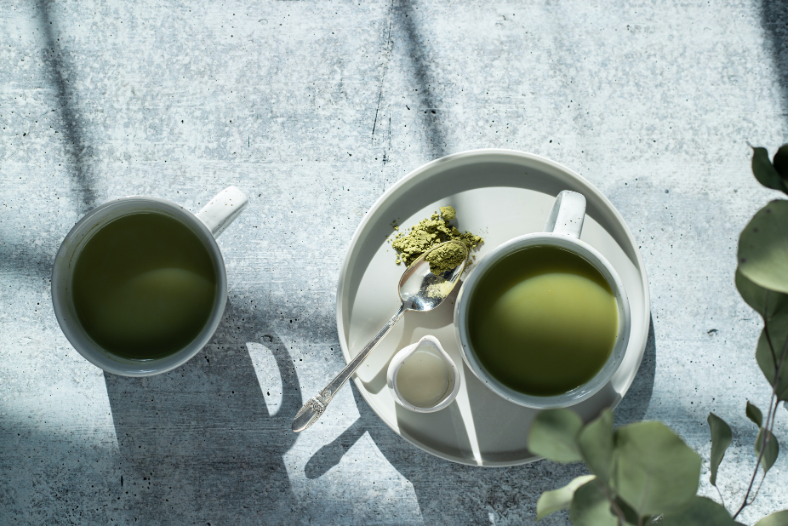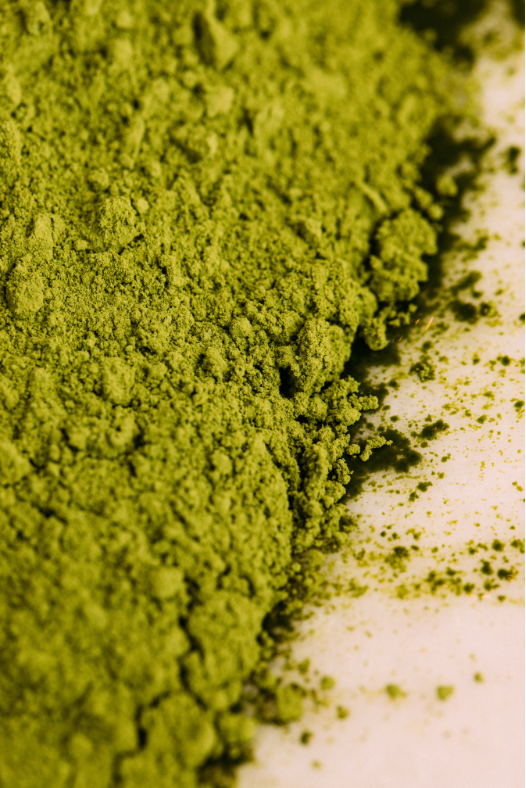Many of us just know matcha as the green-ish latte you can order at a coffee shop. But are there health benefits, too?

What Is Matcha?
So what is matcha, exactly?
Matcha is basically just the special version of green tea.
What’s makes it so special, you ask?
It’s frequently credited as being a mood and brain food (1). Three beneficial components of green tea phytochemicals are caffeine, L-theanine, and epigallocatechin gallate (EGCG).
The three of these constituents were included in a review conducted on 49 human intervention studies in order to measure the acute psychoactive effects of each.
With the exception of EGCG (which had no conclusive evidence in mood-enhancement, as intervention studies were limited), 40 mg of caffeine improved performance on demanding, long-duration cognitive tasks and self-reported alertness, arousal, and vigor while 200 mg of L-theanine improved self-reported relaxation, tension, and calmness.
Caffeine and L-theanine are quite the dynamic duo when paired together—with caffeine stimulating focus and alertness while L-theanine calming the central nervous system.
Matcha Vs Green Tea
Is it a competition of matcha vs green tea?
Is there really a difference between matcha and green tea?
Yes, yes there is.
Matcha and green tea have a rich history…
Both are cultivated from the Camellia sinensis plant. Green tea was used as a precious medicine among elite members of society, while matcha was created by Buddhist monks who began crushing green tea leaves into a rough powder (i.e. matcha). It was even used as a pre-battle tea by Samurai warriors in Japan (2).
Because their cultivation, processing, and preparation methods differ, their health benefits differ too. Both are rich in antioxidants, polyphenols, and a unique amino acid called L-theanine. But with green tea, you’re steeping the tea leaves in hot water and then removing the leaves, thus removing some nutrients along with it. Whereas with matcha, you’re consuming all of the nutrients and caffeine content.
What Does Matcha Taste Like?
Green tea and matcha differ in taste too. This is, again, because they’re cultivated, processed, and prepared much differently.
Something they do have in common when it comes to taste: Their grassy, vegetal taste.
Now for their differences…
Green tea has a light, delicate, and refreshing taste whereas matcha leans more toward a rich, intense flavor. Matcha powder is commonly blended with milk and sweetener to create matcha lattes—which gives it a sweet, frothy taste, whereas green tea is just stepped in boiling water (3).
Caffeine In Matcha
How much caffeine is there in matcha?
There is about 70 mg of caffeine in matcha (4).
To compare, a cup of coffee contains about 95 mg of caffeine.
Health Benefits of Matcha
Matcha touts many health benefits. So much so that it could be beneficial to swap your morning coffee for a morning matcha a few days a week.
Here are some health benefits of matcha that you could be taking advantage of…

1. Stress Reducer
Because of the major amino acid—L-theanine—that’s in green tea, it acts as a stress reducer (5).
In a study conducted on 39 participants, each was given either test-matcha or placebo-matcha. As expected, the test-matcha results came back positive—the participants did, in fact, experience less anxiety.
2. Mood and Brain Enhancer
Since matcha contains the entirety of green leaves, there is a much higher consumption of phytochemicals. Thus, when 49 study participants were given a combination of caffeine, L-theanine, and epigallocatechin gallate (EGCH), performance improved in attention-switching tasks and alertness (but to a lesser extent than caffeine alone) (6).
3. High in Antioxidants
Due to a large number of polyphenols, amino acids, and caffeine, antioxidant properties in matcha green tea increase.
In one study, they poured 100 mL of distilled water at various temperatures over 1.75 grams of powdered green tea leaves. They saw that matcha tea has a high level of antioxidants flavonoids (1968.8 mg/L), polyphenols (1765.1 mg/L), and vitamin C (44.8 mg/L).
Antioxidants assist in reducing oxidative stress stemming from stressful situations such as environmental pollution, unhealthy diet, chronic psychological stress, intense physical exertion, starvation diets, and broadly understood infections (7).
4. Enhanced Fat Oxidation
In a study with 13 female volunteers, researchers analyzed the relationship between walking speed and oxygen uptake during an incremental walking protocol. Participants consumed three drinks (each with 1 gram of Matcha premium grade) the day before the walking protocol and then one drink 2 hours before the 30-minute walk. Although matcha had no effect on physiological and perceived intensity response, it resulted in a lower respiratory exchange ratio and enhanced fat oxidation (8).
5. Inhibits the Growth of Cancer Stem Cells
Researchers experimented with matcha green tea (MGT) and MCF7 cells (an ER(+) human breast cancer cell line) in order to prevent the growth and multiplication of breast cancer stem cells (CSCs).
The results were astounding…
MGT reduced the viability of bulk cancer cells by 8% and inhibited the sphere-formation capacity of MCF7 cells by 50% (9).
Are There Any Side Effects of Matcha?
If you’re sticking to under 8 cups a day, matcha green tea is likely safe for most healthy adults. However, if you’re experiencing anemia, anxiety, bleeding disorders, a heart condition, diabetes, diarrhea, glaucoma, high blood pressure, irritable bowel syndrome, liver disease, or osteoporosis, be sure to consult with a healthcare professional before consuming green tea or matcha (10).
Final Thoughts on Matcha Powder
Overall, matcha hosts a variety of rewarding health benefits. Thanks to its energizing, yet calming properties, it can be a great alternative to coffee—without the jitters, too.
References
- Effect of Green Tea Phytochemicals on Mood and Cognition
- Matcha vs. Green Tea: What Is the Difference?
- 16 Common Questions about Matcha Green Tea
- Caffeine in Matcha Tea
- Stress-Reducing Function of Matcha Green Tea in Animal Experiments and Clinical Trials
- Effect of Green Tea Phytochemicals on Mood and Cognition
- Antioxidant Properties and Nutritional Composition of Matcha Green Tea
- Matcha Green Tea Drinks Enhance Fat Oxidation During Brisk Walking in Females
- Matcha green tea (MGT) inhibits the propagation of cancer stem cells (CSCs), by targeting mitochondrial metabolism, glycolysis and multiple cell signalling pathways
- Green Tea: Uses, Side Effects, Interactions, Dosage, and Warning

